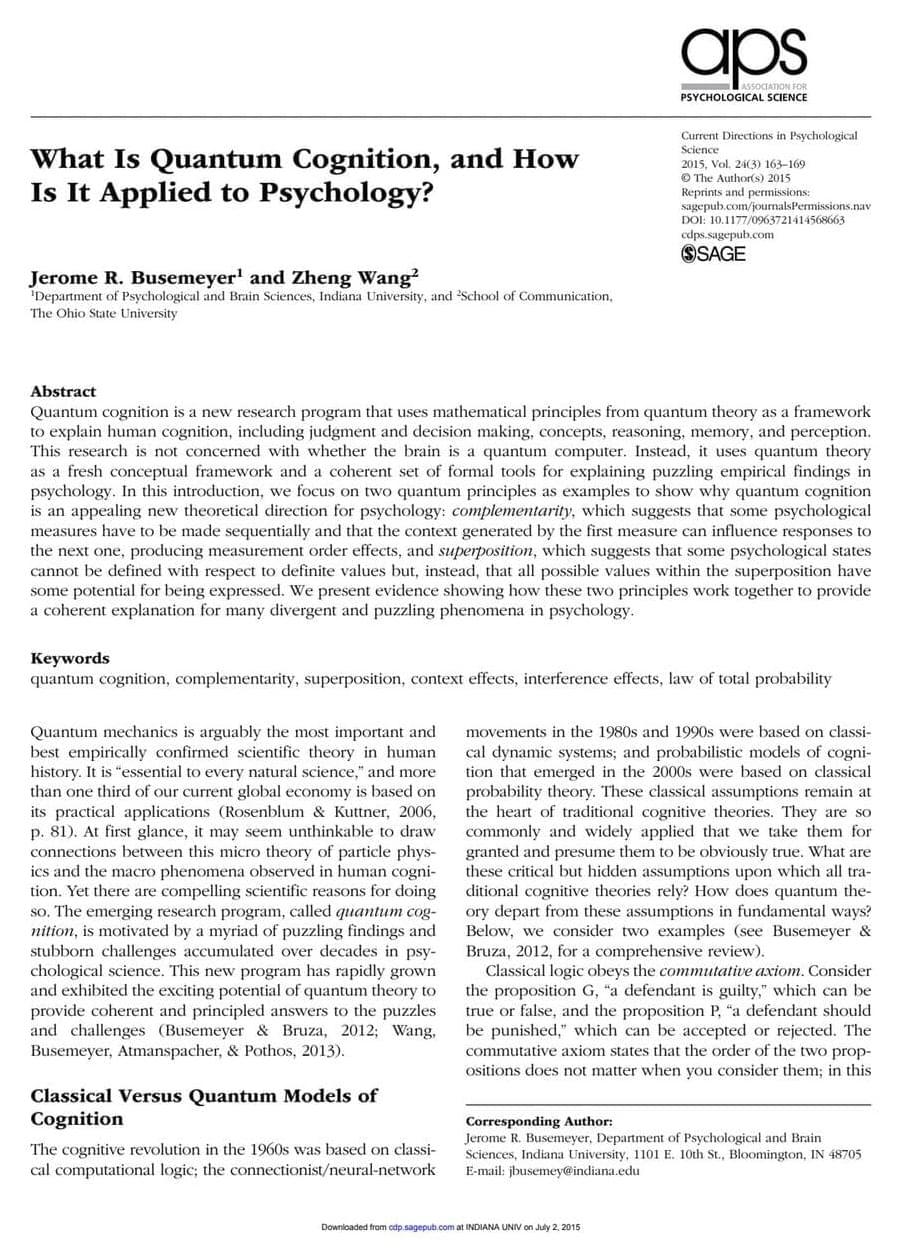Quantum cognition is a new research program that uses mathematical principles from quantum theory as a framework to explain human cognition, including judgment and decision making, concepts, reasoning, memory, and perception. This research is not concerned with whether the brain is a quantum computer. Instead, it uses quantum theory as a fresh conceptual framework and a coherent set of formal tools for explaining puzzling empirical findings in psychology. In this introduction, we focus on two quantum principles as examples to show why quantum cognition is an appealing new theoretical direction for psychology: complementarity, which suggests that some psychological measures have to be made sequentially and that the context generated by the first measure can influence responses to the next one, producing measurement order effects, and superposition, which suggests that some psychological states cannot be defined with respect to definite values but, instead, that all possible values within the superposition have some potential for being expressed. We present evidence showing how these two principles work together to provide a coherent explanation for many divergent and puzzling phenomena in psychology. (PsycInfo Database Record © 2020 APA, all rights reserved)
What is quantum cognition
Posted in quantum physics
This second position, while certainly not inconsistent with realism per se, turns upon a distinction involving a notion of “observation”, “measurement”, “test”, or something of this sort—a notion that realists are often at pains to avoid in connection with fundamental physical theory. Of course, any realist account of a statistical physical theory such as quantum mechanics will ultimately have to render up some explanation of how measurements are supposed to take place. That is, it will have to give an account of which physical interactions between “object” and “probe” systems count as measurements, and of how these interactions cause the probe system to evolve into final “outcome-states” that correspond to—and have the same probabilities as—the outcomes predicted by the theory. This is the notorious measurement problem.
In fact, Putnam advanced his version of quantum-logical realism as offering a (radical) dissolution of the measurement problem: According to Putnam, the measurement problem (and indeed every other quantum-mechanical “paradox”) arises through an improper application of the distributive law, and hence disappears once this is recognized. This proposal, however, is widely regarded as mistaken.[4]
As mentioned above, realist interpretations of quantum mechanics must be careful in how they construe the phrase “the observable A” A A has a value in the set B” B B”. The simplest and most traditional proposal—often dubbed the “eigenstate-eigenvalue link” (Fine [1973])—is that (• holds if and only if a measurement of A” A A yields a value in the set B” B B with certainty, i.e., with (quantum-mechanical!) probability 1. While this certainly gives a realist interpretation of (•,[5] it does not provide a solution to the measurement problem. Indeed, we can use it to give a sharp formulation of that problem: even though A” A A is certain to yield a value in B” B B when measured, unless the quantum state is an eigenstate of the measured observable A” A A, the system does not possess any categorical property corresponding to A” A A ’s having a specific value in the set B” B B.
Scientists have identified a new method of analysing genomic data in a major discovery that means patients with unexplained kidney failure are finally getting a diagnosis.
Humans can sometimes be hard to understand, much like quantum physics — unless you watch this channel regularly of course. That’s why a mathematician has come out with an idea of “quantum cognition”. What is this so-called quantum cognition? Does it explain why humans make irrational decisions? Let’s have a look.
📝 Transcripts and written news on Substack ➜ https://sciencewtg.substack.com/
🤓 Check out my new quiz app ➜ http://quizwithit.com/
💌 Support me on Donatebox ➜ https://donorbox.org/swtg.
👉 Transcript with links to references on Patreon ➜ / sabine.
📩 Free weekly science newsletter ➜ https://sabinehossenfelder.com/newsle…
👂 Audio only podcast ➜ https://open.spotify.com/show/0MkNfXl…
🔗 Join this channel to get access to perks ➜
/ @sabinehossenfelder.
🖼️ On instagram ➜ / sciencewtg.
#sciencenews #science #physics #consciousness
Scientists compared protein engineering with a synthetic library versus error-prone PCR to achieve better variant representation and simpler validation.
Problems with the future of gaming.
A strange bug is removing people’s games on PlayStation 4 and 5, and Vita, and Sony doesn’t have a fix.
It wasn’t long ago that PlayStation sparked fan outrage when it said it would remove Discovery video content from people’s libraries, even though they had paid for it.
PlayStation later backtracked, but a similar, unintentional, issue has now come up: a random bug that’s wiping digital games from people’s libraries.
A new report reveals the chaos behind the startup Stability AI, including an incident where its now-ex CEO disappeared in his pajamas.








